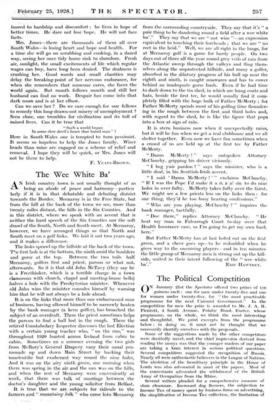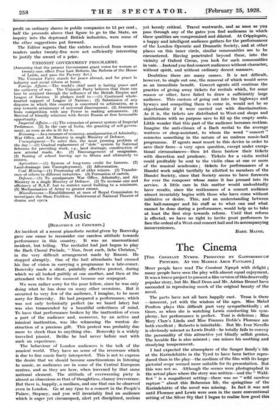The Political Competition
ON January 21st the Spectator offered two prizes of ten guineas each : one for men under twenty-five and one for women under twenty-five, for " the most practicable programme for the next Unionist Government." In the competition for men the prize is awarded to Mr. J. A. R. Pientott, 4 South Avenue, Polaloc Road, Exeter, whose programme, on the whole, we think the most interesting and thoughtful. We print excerpts from the programme below ; in doing so, it must not be thought that we necessarily identify ourselves with the proposals.
Some of the suggestions made by the other competitors were decidedly novel, and the chief impression derived from reading the essays was that the younger readers of our paper are taldng a keen interest in serious political questions. Several competitors suggested the recognition of Russia. Nearly all were enthusiastic believers in the League of Nations. The abolition of the hereditary principle in the House of Lords was also advocated in most of the papers. Most of the contestants advocated the withdrawal of the British Army of Occupation 'from the Rhine.
Several writers pleaded for a comprehensive measure of slum clearance. Increased dog licences, the subjection to
Income Tax of money spent by business firms on advertising, the: simplification of Income Tax collection, the limitation of profit on ordinary shares in public companies to 15 per cent., half the proceeds above that figure to go to the State, an inquiry into the depressed British industries, were some of the other suggestions put forward.
The Editor regrets that the entries received from women readers under twenty-five were not sufficiently interesting to justify the award of a prize.
UNIONIST GOVERNMENT PROGRAMME.
(Assuming that the present Government grant votes for women at twenty-one, effect Poor Law Reform, the Reforraof the House of Lords, and pass the Factory Act.)
The Unionist Party stands for peace abroad, and for peace in industry and social reform at home. Foreign Affairs.—The world's chief need is lasting peace and the outlawry of war. The Unionist Party believes that these can best be attained through the influence of the British Empire and League of Nations. It pledges itself to:—(l) Continued whole- hearted support of League of Nations ; (2) Submission of any disputes in which this country is concerned to arbitration, as a step towards attainment of universal disarmament. (3) Abstention from competition with any Power in making armaments. (4) Revival of friendly relations with Soviet Russia at first favourable opportity. Imperial Affaire.—(1) The extension of present system of Imperial Preference. (2) In the case of India, the granting of self-govern- ment, as soon as she is fit for it.
Economy.—As a measure of economy, amalgamation of Admiralty, War Office, and Air Ministry in single Ministry of Defence. Unemployment.—To solve this, the most pressing problem of the day :—(1) Gradual replacement of "dole" system by National Schemes for providing work, e.g., land drainage, construction of new arterial roads, &c. (2) Encouragement of emigration. (3) Raising of school leaving age to fifteen and ultimately to sixteen.
Agriculture.—(1) System of long-term credit for farmers. (2) Land-drainage (see Unemployment). (3) Afforestation. Coal Mining.—(1) Pensioning off of older miners. (2) Transfer- ence of others to different industries. (3) Formation of cartels.
Defence.—(1) To amalgamate War Office, Admiralty, and Air Ministry in a single Ministry of Defence. (2) To increase size and efficiency of R.A.F. but to restrict naval building to a minimum. (3) Mechanization of Army to greater extent.
Miecellaneous.—Establialanent at once of Royal Commission to investigate the Slum Problem. Endowment of National Theatre of drama and opera









































 Previous page
Previous page